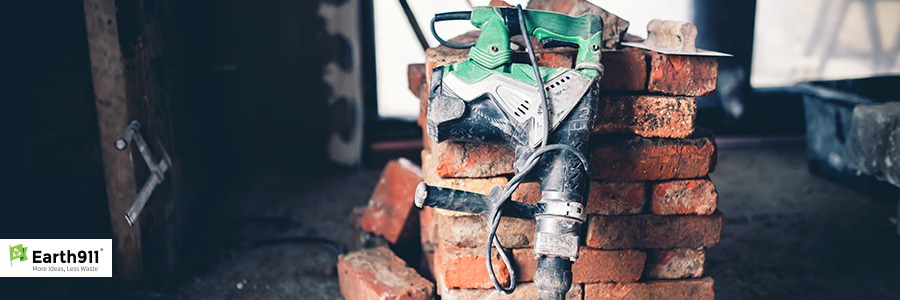
Consumers might not generate a lot of construction waste, but certain types of wood, brick, and carpet that homeowners use fall under this category. If you’re planning any home renovation projects, be sure to have a game plan for the waste you’ll inevitably produce. And use our recycling locator below to find out where to recycle construction waste.
Find Recycling Guides for Other Materials
Frequent Construction Waste Recycling Questions
Can construction waste go in curbside recycling or trash?
Typically, construction waste does not belong in your curbside program because of its size, bulk, and weight. Check your local options by using the recycling locator below.
Is it best to rent a dumpster for a bigger remodel job? Will the waste be recycled?
You may end up saving a great deal of time by having an on-site dumpster, rather than driving back and forth to dump your waste. Many companies will not only provide you a container for your scraps, but sort and recycle them for you after pick-up. Waste Management’s Bagster is one example of a service like this. Ask about the recycling options for your construction waste when you order your dumpster to be sure the company you’re using will work to throw out as little as possible.
What actually counts as construction waste?
Known as construction and demolition (C&D) materials, construction waste can be anything from concrete and flooring tiles to plumbing fixtures and doors. Other materials like wood, metal, bricks, and glass also count. Even the trees, stumps, and earth from clearing sites are considered construction waste.
Is there anywhere I can donate old cabinets, sinks, mirrors, and other fixtures?
Absolutely. There are many local charities that want your usable household items. One example available nationally is Habitat for Humanity ReStores, where proceeds go to fund Habitat for Humanity projects.
How does “deconstruction” work? How do I find a local company that does it?
Deconstruction essentially means that pieces of a home or building are carefully dismantled in order to be used again. You can check out this handy guide on getting started. You can also check out the Deconstruction Institute for more details.
Additional Reading
- Deconstructing Construction Waste: Instead of disposing of demolition waste in landfills, many deconstructed materials can be recycled. Others may be reusable as-is in new construction and remodels.
- Closing the Loop With Architectural Salvage: Incorporate reuse into your building project with architectural salvage, and you can end up with results that are as stylish as they are ecological.
- Using Reclaimed Materials in Your Home & Yard: Using reclaimed materials in your construction and landscaping projects can add beauty and charm. Here are some easy steps to get you started.
